|
What would you get if you put a Hammer-esque horror and a Mexican lucha libre wrestling tale into a cinematic blender? The Panther Women, that's what, a 1967 film from our old pal René Cordona, he of The Bat Woman (La mujer murcielago, 1968), Night of the Bloody Apes (La horripilante bestia humana, 1969), and a whole string of movies featuring the silver-masked crime-fighting wrestler El Santo, including the 1970 Santo vs. the Riders of Terror (Santo contra los jinetes del terror). If you're already a fan of horror and lucha libre movies, you're in for a treat. If horror is your bag and you've never seen a lucha libre film, there's a good chance you'll be left scratching your head raw with confusion by some of what unfolds here.
It begins with a scene that should warm the hearts of any fan of old-school horror, as Satanasa (Maria Douglas), the female leader of a two hundred year-old satanic panther cult, sets up the plot by telling her fellow disciples what they doubtless already know, but in a ceremonial and handily expositional way. That she does so in an underground cave with a fire-breathing statue of a panther had me energetically rubbing my hands with anticipatory glee. She reveals that the cult's original high priest Eloim was killed by a man named Hector Pietrasanta using a fearsome weapon known as the Flaming Sword of the Druids. Since then, everyone bearing the surname of Pietrasanta has been killed by the cult, and according to Satanasa, Eloim has ordered them to exterminate the last four members of the Pietrasanta bloodline before the full moon. Oh, I was so on board for this.
It's then that we're reminded that this is not just a horror tale when we're treated to a luchadora (female wrestling) match in which unmasked wrestlers Loreta Venus (Ariadne Welter) and her American partner Golden Rubí (Elizabeth Campbell) demonstrate why they are champions in their field by repeatedly flooring their opponents using the same throws over and over. It does the trick, and when the match concludes, who should breeze into their changing room to ask them out to dinner but Loreta's uncle Professor Rafael (Jorge Mondragón) and his adult son Ramón (Jenaro Moreno). Anyone like to guess what their surname is?
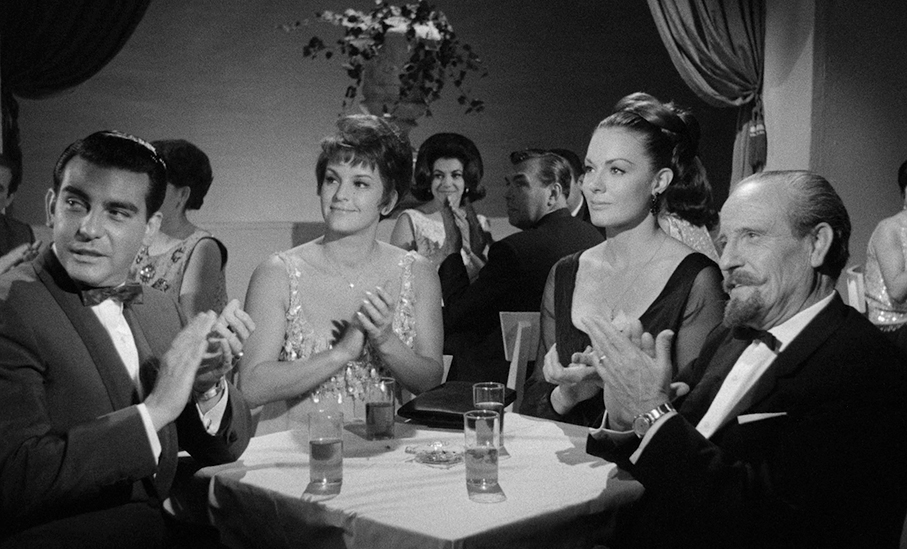
Once at the nightclub, they are entertained by an exotic dancer named Tongo (played by real-life exotic dancer Yolanda 'Tongolele' Montes), whom the observant should quickly recognise was one of the Panther Women in that opening scene. When the dance concludes, Ramón introduces Tongo to his companions as his fiancée, and not once does a flicker of a smile cross Tongo's unwaveringly stern face. Rafael and Ramón have no idea that they're in danger at this point, but this changes when one of Panthers pops a note under Rafael's door informing him that he and his family members are soon to be killed. Oh sorry, not killed, annihilated. That's much worse. Venus laughs this off but Rafael is not so sure, and takes the opportunity to inform his companions and the audience about the origins of Eloim. We learn he was a leprous enchanter whose plan to have the Panther Women enslave mankind was foiled when the aforementioned Hector Pietrasanta killed him with the magic Druid sword, which the professor handily still owns. Quite why the American Hector was known as the Mage of Turin is left tantalisingly dangling in the wind.
The film then goes full Hammer in the best sense of that term, as Satanasa wanders through a graveyard by night, through a secret crypt door and into the underground cave from the opening scene. Here she hails the fire-breathing panther statue and twists a barely visible switch, which prompts the lid of a stone coffin to slowly open, where an internal light and wisps of dry ice give only a hint of the terror that lies within. There's even a splendid music score in the James Bernard style that may or may not have been partially borrowed from elsewhere. No composer is credited, so I'll have to tip my hat to musical director Antonio Díaz Conde instead. It's shortly after this that Rafael gets the nastiest and very last surprise of his life. And some iffy Halloween costume fangs aside, it's a quality sequence. And then…
And then the police get involved and – for this viewer at least – all the fine work that the film has so far done comes close to being undone by a single character. I'm not talking about lead investigator Captain Arturo Díaz (Eric del Castillo), but his fist-magnet of a sidekick, Leocadio (Manuel 'Loco' Valdés). Obviously written and cast as the comic relief, I found Leocadio about as funny as herpes. He also makes no sense, even within the fantasy logic of a film in which a small cult of women can kill by partially transforming into panthers. While Captain Diaz is a solid and dependable investigator in the traditional mode, the useless Leocadio is terrified of everything and anything, reacting with wide-eyed, gulping horror when Venus recites the legend of Eloim to Diaz, and hanging nervously onto Rubí's arm as they enter a warehouse in which trouble may be lurking. How did this cowardly twerp ever become a cop at all, let along rise to the rank of detective? It doesn't help that Valdés plays to a gallery somewhere on the dark side of the moon, over-exaggerating every expression and reaction to the point where I wanted to reach through the screen and start repeatedly slapping him every time he appears.
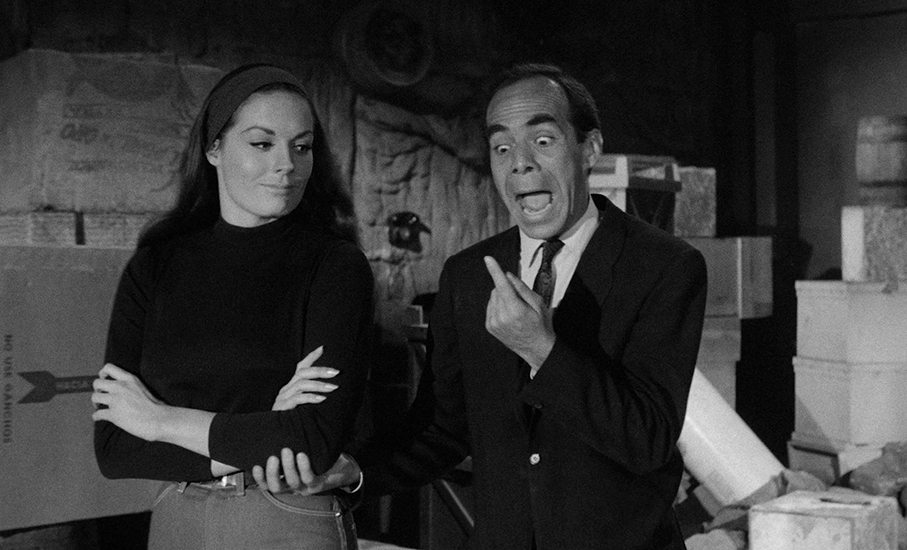
Of course, it's always possible that Leocadio's cartoonish cowardice was designed to emphasise the strength and bravery of Venus and Rubí, but these qualities are self-evident from the off. The women show none of Leocadio's fear, and launch themselves into a fist fight with a gang of male goons while the dopey detective runs mincingly in circles in a panicking effort to avoid being hit. In the special features, Valeria Villegas Lindvall suggests he might have been intended as a bit of queer coding, but if so he's doing the gay community no favours with this display of what could be construed as stereotypical effeminacy. I'm sure there are those who will find his antics highly amusing – two of the contributors to this disc clearly enjoyed them – and I have little doubt that they played well to an audience on home turf at the time of the film's release, but for me it's like having a gurning Norman Wisdom suddenly appear midway through a Val Lewton film. His performance particularly jars in an otherwise likeable cast that is able to sell even the more implausible elements of the story by playing them straight. I particularly liked Niña Elenita Saldivar as Ramón's young daughter Paquita, who shares with loyal animals an ability to instantly recognise evil when she sees it, and is able to express fear with real conviction. And when it comes to great faces, wrestler Nathanael 'Frankenstein' León is sublime casting as the Panther's head goon, Cain.
Presented with the seemingly illogical premise that Rafael was killed in his own home by a panther, Captain Diaz elects to call in the help of an investigator friend, and this is where those new to lucha libre cinema will experience their first real "what the hell?" jolt. The friend in question is not an overcoat-dressed gumshoe, but a bare-chested, cape-wearing wrestler named El Angel (Gerardo Zepeda) with a white hood bearing a wing motif. And that cape is something special. Just seconds after Diaz walks into Angel's workshop, he's shown that it is resistant to both fire and bullets, which gives our Angel a half-century start on John Wick's equally preposterous bullet-proof suit. Angel also reveals to the captain that he has invented a watch that doubles as a two-wave radio, a Batman-like gadget that allows him and Diaz to stay in constant touch. But why, you might ask, would a level-headed detective like Diaz need the help of a wrestling investigator, particularly so early in the case? We quickly find out when the brightly attired Angel is able to eavesdrop unseen on a conversation between Satanasa and Tongo from outside of their upstairs apartment window, and yet Diaz and Leocadio are spotted by Satanasa just seconds after they start surreptitiously following her. It's not that Angel is an exceptional detective, it's just that the cops aren't that good at their job.
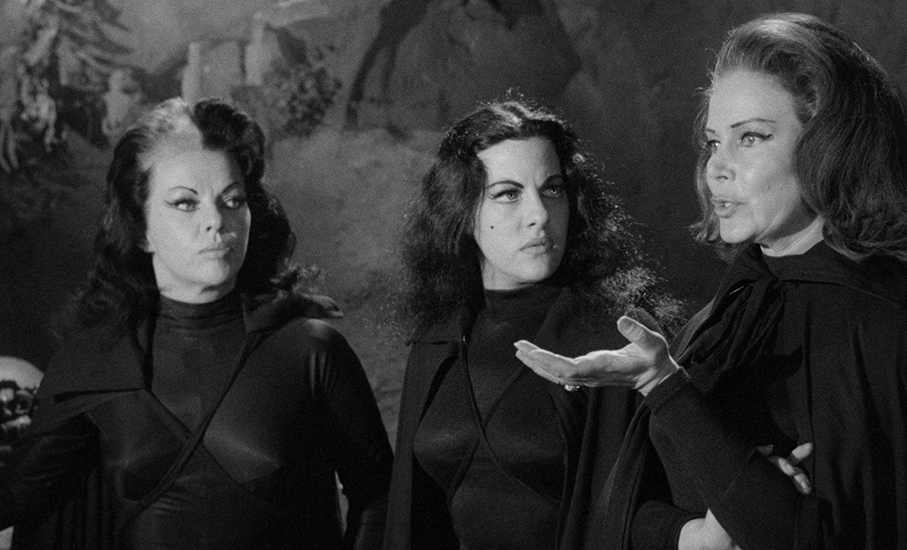
Although a standalone work, The Panther Women was the fourth film in a short series of luchadora films directed by René Cardona featuring Golden Rubí and Venus, with Rubí always played by Elizabeth Campbell and Venus previously played Lorena Velázquez*. El Angel, meanwhile, is clearly modelled on El Santo, and the manner in which this film concludes clearly suggests that the filmmakers were hoping this would be the first in an equally successful franchise. As far as I'm aware, that never happened. Cardona once again directs with drive and unflashy gusto, while Agustín Jiménez's atmospheric black-and-white cinematography lends the standout horror elements an air of tangible menace. The makeup on the performed panther women is not that great (in his commentary, Keith J. Rainville likens it to a Catwoman costume), but the monster makeup and raggedy costume on the resurrected Eloim is pretty darned impressive. Except for his shoes. Seriously, what is going on there?
The film's internal logic just occasionally becomes subservient to genre requirements, notably in Satanasa's plan to kill Venus and Rubí by having two of the panther women disguise themselves as a masked wrestling duo known as the Shadows and challenge them to a title fight. This delivers the film's most impressive slice of in-ring wrestling, but the logic of the plan really did elude me. The idea is that the women dressed as the Shadows get thrown about the ring until precisely 10pm, when they will transform into Panther Women and tear their opponents to bits. In front of hundreds of witnesses and TV cameras. What's that going to do for your secret panther cult, eh? And why wait until 10pm? Yet when the film goes headlong on its horror and crime buster elements, it often delivers with style, notably in the almost transgressive sacrificial targeting and menacing of the young Paquita, and the sequence in which Eloim climbs into her bedroom at night is as creepy as anything from the golden age of Universal horror. And although it cops out a bit at the end, it's uplifting to encounter a genre film from the 1960s in which the female characters get to play such prominent and active roles, both as imposing villains and lead characters capable of handling themselves in a punch-up and unafraid to dive in when the action kicks off. My only regret is they never get the chance to give Leocadio the serious pounding he thoroughly deserves. That I would pay good money to see.
The Panther Women was restored in 2K by Permanencia Voluntaria and Cinema Preservation Alliance from the original camera negatives, and the resulting 1080p transfer on Indicator's Blu-ray looks terrific. Framed in its original aspect ratio of 1.66:1, the monochrome picture here displays a generous contrast range without sacrificing the inkiness of the black levels or crushing the shadows. The image detail is well defined and, save for a very small number of brief shots, is clean of any obvious signs of dust, wear or damage. A fine film grain is evident throughout.
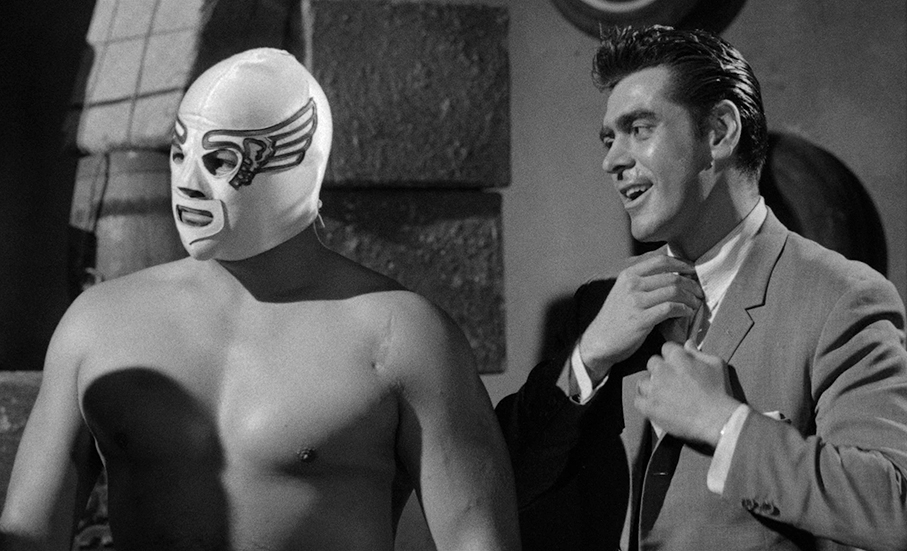
The Linear PCM 1.0 mono soundtrack was remastered from the film's original optical track, and although exhibiting some expected restrictions in the tonal range, it's otherwise clear and free of damage and background fluff.
Optional English subtitles are activated by default.
Audio Commentary with Keith J. Rainville
Keith J. Rainville, publisher of From Parts Unknown and screenwriter of the animated feature Los campeones de la lucha libre, delivers a most enjoyable, information-packed and often scene-specific commentary. He provides information on the lead players, director René Cardona and screenwriter Alfredo Salazar, as well as a string of recommendations for other related Mexican films and a fun deconstruction of the tropes of Mexican horror cinema of the period. He praises lead actors Tongolele and Elizabeth Campbell, the resurrected Eloim's make-up (although, like me, he has some questions about his curious footwear), and what he describes as a "legitimately terrifying bedroom invasion scene." He's also not above criticising the film when it bows to convention, groaning with disbelief when Rubí faints into El Angel's arms at the sight of the approaching Eliom. There's loads more here, all of it most worthwhile.
The Killer Film: Let Them Fight! (14:26)
The masked critic, filmmaker and lucha libre specialist, The Killer Film is back (see Santo vs. the Riders of Terror) to deliver a heap of information on The Panther Women and the luchadora film cycle. Astonishingly, there's very little crossover with the torrent of material delivered by Keith J. Rainville in his commentary, and when the same ground is covered, new details are almost always provided here. There's useful information on the luchadoras that appear in the film, the graveyard that I had assumed was a set is identified as the San Fernando cemetery, and El Angel's in-ring opponent is revealed to be Cavernario Galdino, who is described here as "the second most famous wrestler in the history of lucha libre." Most fascinating of all is the look at a few earlier films that might have helped to inspire the genre, the most unexpected of which is a 1901 silent by that master of film wizardry Georges Méliès titled The Fat and Lean Wrestling Match, a couple of extracts from which have been included.
Valeria Villegas Lindvall: Cat Fight (23:38)
Academic and Latin American horror specialist Valeria Villegas Lindvall takes a deep dive into the representations of gender in The Panther Women, highlighting and exploring the various oppositional ways in which this manifests itself. When I say a deep dive I mean it, with Lindvall pointing things out that would never have occurred to me and explaining how they relate to or are influenced by societal, historical and cinematic precedents. It's the sort of thoughtful feminist deconstruction that would doubtless have the likes of the Daily Wire frothing at the anus, but to me it all made perfect sense and had me looking at the film in a whole new light.
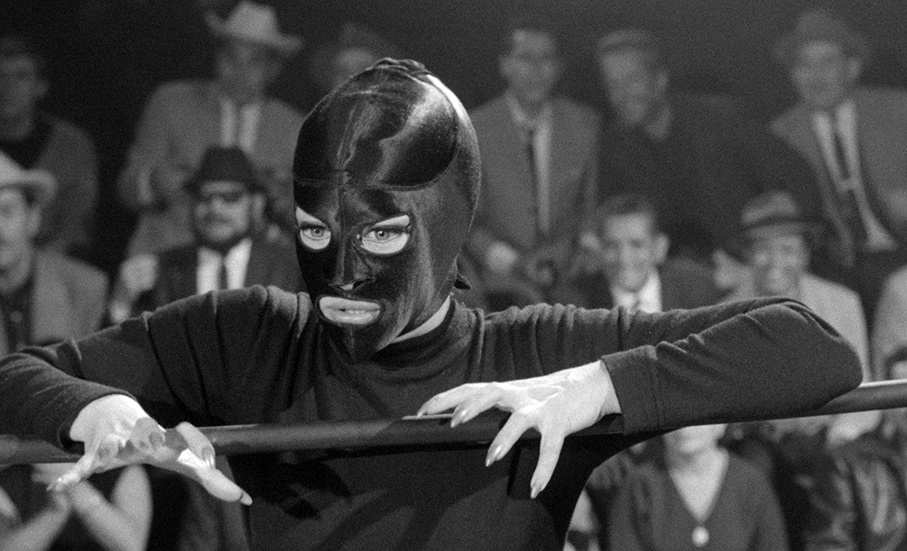
Theatrical Trailer (3:45)
An overlong hard sell peppered with spoilers, but it does the job.
Image Gallery
42 screens of promotional stills, lobby cards and posters.
Booklet
The lead essay here is by senior lecturer in film studies at King's College London, Iain Robert Smith, and it's an excellent read, examining the film and its importance to female wrestling (the public performance of which, as The Killer Film also notes, was banned in Mexico City at the time) and drawing a line through to Brett Whitcomb 1986 documentary GLOW: The Story of the Gorgeous Ladies of Wrestling and the Netflix series GLOW, both of come warmly recommended from this quarter. Next up is a compelling article by Janina Möbius from the December 2015 issue of Artes de México – translated by Michelle Suderman, who really deserves a shout here – that looks at the popularity of lucha libre in Mexico, how it has become ingrained into the identity of the country's working class, and the measures taken to suppress it by wealthy scumbags in positions of power. Historian, documentary filmmaker, and university research professor Ricardo Cárdenas Pérez then takes an in-depth look at the history of Mexican female wrestling, René Cardona's luchadora films, and the representation of gender roles within them. This, once again, proves essential and educational reading. Next we have a welcome interview with producer Guillermo Calderón, which was conducted by Viviana García Besné and Alistair Tremps during the production of their 2019 documentary Perdida (which is included as a special feature on the Indicator Blu-ray of Santo vs. Infernal Men). A lot of ground is covered here, including why he chose a career in film, the uniquely Mexican cabaretera, fichera and lucha libre genres, the negative impact on his work of President Luis Echeverría, and more.
Of the three René Cardona lucha libre films recently released on Blu-ray by Indicator, The Panther Women may well be my favourite, despite my aversion to the comedy stylings of Manuel 'Loco' Valdés. The transfer is excellent, and as someone with little prior experience of the lucha libre genre, I really appreciate the sheer volume of information provided in the excellent supplementary features. Seriously, I probably learned more from this release than I did in the whole of my last year at school. Lucha libre fans will doubtless have pre-ordered this one, but I'd prompt fans of old-school Hammer horror to give it a look as well. Definitely recommended.
|